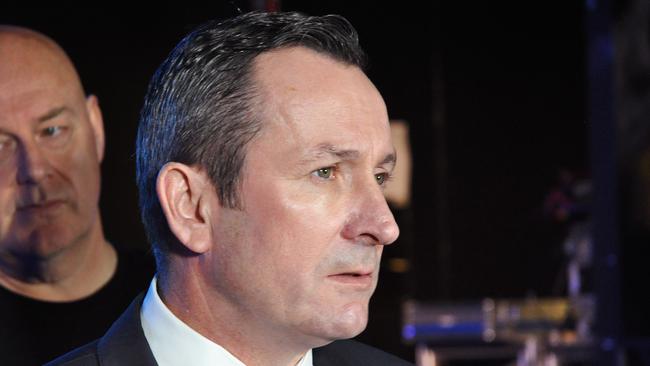WA budget: McGowan projects surplus in two years
Government banks on a strengthening economy and the lowest rate of spending growth in two decades | WINNERS & LOSERS

The McGowan government is predicting that Western Australia’s strengthening economy, combined with the lowest rate of spending growth in two decades, will help return the state’s battered finances to surplus within two years.
Treasurer Ben Wyatt today handed down a budget that lacks bold measures aimed at slashing the government’s net debt, which is lower than previously forecast but will still peak at $40.9 billion in 2020.
Despite speculation Labor could announce asset sales in the budget to reduce debt, Mr Wyatt said proposals to privatise the government-owned TAB betting agency and Landgate land titles registry were still under discussion.
Premier Mark McGowan said Labor had halted the growth in debt and it would be paid off “just like paying off your family mortgage”.
The government is forecasting an operating deficit of $906 million next year followed by a deficit of $160 million in 2019-20.
But the budget is projected to return to a surplus of $1.3bn in 2021-21, boosted by increased payroll tax revenue, higher commonwealth grants and a return of GST money from Canberra.
If achieved, it would be WA’s first budget surplus since 2013-14 under then Liberal treasurer Christian Porter.
Mr Wyatt said expenses growth was forecast at just 0.9 per cent next year — the lowest rate in 20 years — and would average 1.2 per cent a year over the forward estimates.
This is being driven by lower growth in recurrent health spending as well as government measures aimed at restraining wages in the public service.
Mr Wyatt nominated the projected spending restraint as the biggest achievement in Labor’s second budget.
“I nearly killed myself getting to 0.9 per cent,” he said. “0.9 per cent is the magic number in this budget.”
The government announced additional spending of $750 million over four years for its big-spending Metronet rail network, including the Ellenbrook rail line.
On the revenue side, the government’s proposed foreign buyer surcharge on residential property will increase from 4 per cent to 7 per cent, raising an additional $50m over three years.
The 7 per cent rate will bring WA into line with NSW, Victoria and South Australia.
Households are also facing a $292 increase in fees and charges next year.
According to the budget, WA’s GST receipts will increase to 47.3 per cent of the state’s population share next year, rising to 64.9 per cent by 2021-22.
In addition, an increase in commonwealth funding ($1.2bn over the next three years) will contribute to Metronet, hospital and roads.
WA’s economy is forecast to grow 3.25 per cent in 2018-19, driven by an increase in exports of iron ore, lithium and gold.
Mr Wyatt said 50,000 jobs were expected to be created this financial year and next year.
The unemployment rate is forecast to remain at 5.75 per cent next year but will fall to 5 per cent in 2021-22.
WINNERS AND LOSERS
WINNERS
Health - $37 billion total investment, including $655m in infrastructure over four years, with projects such as $182.3m for the patient assisted travel scheme, $158m for the Joondalup Health Campus and $4.4m for the Peel Health Campus
Education - $22.2 billion in total over four years, including $468.7 to build and improve schools
Police and justice - $78.8m to build the Armadale Courthouse and Police Complex, $26.9m for a new police helicopter, $20.5m for the new Target 120 initiative to reduce juvenile reoffending, and $4.2m for two additional magistrates
E mergency services - $128.5m for critical fire emergency services including $19.5m for volunteer and marine rescue groups
Regional WA - Continued investment of $1 billion per year for Royalties for Regions including roads, schools and health facilities such as $73.3m for the Geraldton Health Campus, $9.3m for 33 additional alcohol and drug rehabilitation beds, but no backflip on the Moora Residential College closure
LOSERS
Households - The average household will be slugged an extra $292.07 a year for utilities and other fees
Foreign residential buyers - Surcharge increases to seven per cent, bringing WA in line with most other states. Expected to raise $50m over the forward estimates
Miners - No longer exempt from a building and construction industry training fund levy. Expected to yield $25m over four years
Mining and public water supply sectors - New fees range from $5357 to $8929 for a 10-year licence, with renewals costing between $4001 and $6668. Expected to recover $2.9 million over four years
Recreational fishers - Licences will go up by $5, providing $1.1m annually for recreational fishing management and initiatives, but the fee will remain unchanged for the rest of this term of government.
AAP


